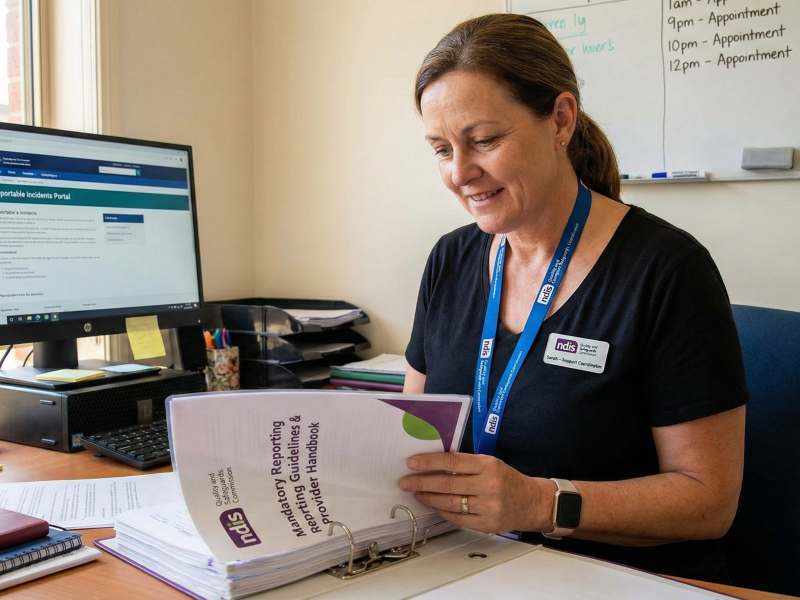The NDIS Practice Standards form a vital element of the National Disability Insurance Scheme (NDIS) infrastructure. They define what is expected for the quality, safety, and provision of services for NDIS Participants. Enforced by the NDIS Quality and Safeguards Commission (NDIS Commission), the Practice Standards provide a structured framework that help NDIS Providers meet regulatory requirements and continuously improve the quality of their services.
The NDIS Practice Standards ensure that NDIS Participants consistently receive respectful, person-centred supports that promote their rights, independence, and overall wellbeing. These Standards form the foundation for Provider Registration and continuous quality improvement, making them essential for all organisations operating within the NDIS sector. Whether you’re a sole trader or part of a larger organisation, understanding and implementing these Standards is crucial for maintaining compliance with Registration obligations and ensuring the ongoing delivery of high-quality services to Participants.
Role of the NDIS Quality and Safeguards Commission
The NDIS Quality and Safeguards Commission has a central responsibility to safeguard the rights of NDIS Participants, ensuring the delivery of disability supports across Australia is consistently safe, ethical, and high quality. The Commission establishes and oversees the NDIS Practice Standards and the Code of Conduct, actively monitoring Providers to ensure ethical and legal compliance.
Its key responsibilities include:
- Managing NDIS Provider Registration, including processing applications and overseeing Audit outcomes.
- Responding to complaints and reportable incidents, ensuring issues are investigated and addressed appropriately.
- Monitoring compliance with the NDIS Practice Standards and the NDIS Code of Conduct to ensure safe and quality service delivery.
- Taking regulatory and disciplinary action when Providers fail to meet their obligations or breach standards.
- Delivering education and training to help Providers and Workers understand their responsibilities and continuously improve the quality of supports.
Want to Attract More NDIS Clients?
Get expert advice on how to market your services, connect with clients, and grow your practice.
Elements of the NDIS Practice Standards
The NDIS Practice Standards are structured into distinct Modules that outline measurable outcomes and clear quality indicators. This structure enables Auditors to effectively assess compliance with Provider Obligations, while also ensuring Participants have transparency and understanding of the quality of supports they can expect from Registered Providers.
These standards are categorised under:
Verification Module
Applicable to Providers delivering lower risk supports and services. Practice Standards in this Module include:
- Human Resource Management
- Risk Management
- Complaints Management
- Incident Management
Core Module
Applicable to Providers delivering high-risk supports and services. Practice Standards in this Module include:
- Rights and responsibilities
- Governance and operational management
- Provision of support
- Provision of supports environment
Supplementary Modules
Applicable to Providers delivering specialist supports and services. The Supplementary Module is typically assessed alongside the Core Module Practice Standards. The Supplementary Modules include:
- High Intensity Daily Personal Activities (Module 1)
- Specialist Behaviour Support (Module 2)
- Implementing Behaviour Support Plans (Module 2A)
- Early Childhood Supports (Module 3)
- Specialised Support Co-ordination (Module 4)
- Specialist Disability Accommodation (SDA) (Module 5)
Registered Providers must demonstrate compliance with the relevant Modules associated with their Provider Registration Certificate, ensuring that services delivered under the scheme are both ethical and accountable.
Application of the NDIS Practice Standards
The NDIS Practice Standards are applicable to all Registered NDIS Providers, whether large or small, and whether providing core, capacity-building, or capital supports. Compliance with the NDIS Practice Standards is not mandatory for Unregistered Providers, although conformity with these standards can increase credibility and quality of services.
NDIS Registration, and adherence to the NDIS Practice Standards, are required for Providers who want to deliver:
- High-risk supports (e.g., high intensity daily personal activities, behaviour supports)
- Services for Participants whose Plan is managed by the NDIA
The extent of compliance varies according to the Registered Provider’s supports and services delivered to Participants. The standards offer a consistent and scalable framework to support quality throughout the disability support industry, and promote Participant confidence, trust, and safety in Providers accredited by the NDIS.
NDIS Provider Registration Process
To be accredited by the NDIS as Registered, Providers must pass a formal Verification or Certification Audit, depending on the services it delivers.
The Registration Process includes:
Preparation of NDIS Document Suite
Providers must have Module-specific NDIS Policies and Procedural Forms to support the delivery of services to NDIS Participants
Application via PRODA
Includes Self-Assessment against the NDIS Practice Standards
Audit
Verification Audits for lower-risk supports delivered under the Verification Module.
Certification Audits for higher-risk supports delivered under the Core and Supplementary Modules.
NDIS Commission Assessment
The Commission may ask for further information from Applicants prior to making a determination.
Audit Outcome & Submission
An Approved Quality Auditor is responsible for assessing whether Providers comply with the NDIS Practice Standards. During an Audit, the Auditor reviews the Provider’s documentation, interviews staff, and inspects service delivery sites to verify adherence to these Standards. After completing the Audit, the Auditor prepares an Audit Report with recommendations, which is submitted to the NDIS Commission. The Commission then reviews both the Provider’s online application and the Audit Report to determine whether the Provider meets requirements for NDIS Registration.
Registration Duration
Generally, the Registration Cycle for all Registered Providers is 3 years. Providers who undergo a Certification Audit must also have a midterm Audit at 18 months to review their compliance throughout the first half of the Registration Cycle. Good preparation and engaging with expert consultants can make a big difference to Audit success at both the midterm and renewal stages of the Registration Cycle.
Referrals Start With Reputation – We’ll Help You Build Both
From networking tips to service refinement, we guide NDIS providers toward lasting impact.
NDIS Code of Conduct
The NDIS Code of Conduct defines the standards of behaviour expected from all NDIS Providers and Workers. Adherence to the NDIS Code of Conduct isn’t optional, it’s a legal obligation for both Registered and Unregistered Providers, and their Workers.
The Code mandates people who deliver NDIS supports and services to:
- Act respectfully, honouring each Participant’s rights, self-determination, and freedom of choice.
- Respect the privacy of Participants and protect their personal information.
- Provide supports safely and competently, ensuring they have the right skills and training.
- Behave with integrity, honesty, and openness in all dealings with Participants.
- Act promptly if there are concerns about the quality or safety of supports delivered.
- Take all reasonable steps to prevent and respond to abuse, neglect, violence, exploitation, and discrimination.
- Take all reasonable steps to prevent and respond to sexual misconduct.
- Never overcharge or unfairly increase prices for NDIS Participants without proper justification.
Adhering to the NDIS Code of Conduct is essential to providing safe, respectful, and high-quality services. The Code supports the broader NDIS Practice Standards, ensuring the services delivered consistently meet quality and safety requirements, creating a trustworthy environment for Participants and Providers.
Avaana’s Assistance for NDIS Certification
Avaana’s NDIS Consultancy service assists NDIS Providers through the sometimes confusing path to Registration, along with ongoing compliance obligations. Their assistance is custom-tailored to aid Providers through the process.
Avaana assists with:
- Documentation review: Aligning policy and procedures to NDIS Practice Standards
- Gap analysis: Determining areas for improvement prior to Audit
- Pre-Audit preparation: Equipping Providers with the skills to approach formal Audits with confidence, including self-assessment and application lodgement support
- Training and guidance: Providing ongoing support to Provider businesses
Avaana simplifies, organises, and streamlines the Registration application process, taking pressure off Providers while assisting them to achieve the high standards required by the NDIS Commission.
FAQs
1. What are the NDIS Practice Standards, and why are they significant?
The NDIS Practice Standards are federally legislated guidelines that ensure NDIS Providers deliver safe, high-quality, and Participant-centred services. They are significant because they uphold Participant rights, ensure consistency in service delivery, and foster ongoing improvement throughout the sector. Adherence to these Standards is mandatory for Registration as a Provider and provides assurance to Participants, families, and the wider disability community.
2. How does an NDIS Provider achieve Registration?
To become a Registered NDIS Provider, an organisation must first apply through the NDIS Commission portal and complete a Self-Assessment. The Provider must then engage an NDIS-accredited Auditor to conduct an Audit, evaluating their compliance against the relevant Practice Standards. Following this Audit, the Auditor submits a report to the Commission, which reviews the findings and determines the outcome of the Registration application. Registration typically remains valid for three years, with ongoing monitoring required.
3. How long does it take to become NDIS Registered?
The Registration process generally takes around three months, though this timeframe may vary based on the Provider’s preparedness. The process involves preparing documentation, completing a Self-Assessment, undergoing an Audit, and awaiting the NDIS Commission’s decision. Delays may occur if corrective actions are required after the Audit. Therefore, early preparation and professional guidance are strongly recommended.
4. In what ways does Avaana assist NDIS Providers with Registration?
Avaana supports NDIS Providers through the complete NDIS Registration application process and with ongoing management of their NDIS Registration. This ongoing support ensures Providers uphold their obligations and responsibilities, which are reviewed during periodic Audits. Avaana’s experienced consultants deliver comprehensive assistance, including preparation of tailored policies and documentation, addressing identified compliance gaps, and providing practical training to prepare for Audits. Avaana also helps Providers liaise effectively with NDIS-accredited Auditors, ensuring continuous compliance and readiness for regulatory requirements.


